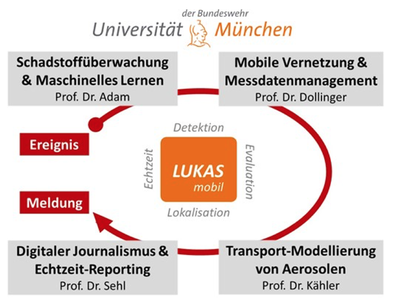Mobile Air Pollution Warning System for Health, Environmental and Disaster Protection by Real-Time Monitoring and Evaluation of Atmospheric Aerosols and Location of the Pollutant Source (LUKAS)
Sub-project: Mobile networking and measurement data management
Funded by the Center for Digitization and Technology Research of the German Armed Forces (dtec.bw)
Duration: 2021-2024
https://dtecbw.de/home/forschung/unibw-m/projekt-lukas

Motivation
The LUKAS project is an interdisciplinary approach to develop an innovative mobile system for real-time monitoring and detection of pollutants in the atmosphere. It is based on a novel laser mass spectroscopic technology to detect the composition of airborne single particles (aerosols). At the same time, the system uses real-time data analysis and meteorological modeling to enable pollutant source location, pollutant dispersion prediction, and prospective warning to a base or to the public, including via web app. LUKAS is suitable for various applications in disaster prevention, health and environmental protection, and civil defense.
Project goals
- Development of a mobile air pollution warning system
- Detection of particle-bound organic and inorganic pollutants in the atmosphere
- Real-time measurement at ultra-low concentrations i.e. down to single particles
- Real-time data analysis and fail-safe communication between sensor nodes and base
- Prediction of pollutant dispersion and source location through adapted transport modeling
- Warning notification, including through web app with automated text generation and customized graphics
Possible fields of application
- Environmental and health protection
- (Large-scale) Area monitoring e.g. of coasts, urban and marine areas
- Characterization of pollutants
- Source attribution e.g. ship, road traffic, building heating, industry
- Emergency services
- Early detection of technical incidents, forest fires etc.
- Civil defense and crime prevention
- Detection of e.g. toxic substances, explosives
- Crowd monitoring
Tasks in the sub-project
The task of the sub-project is to network the mobile measuring stations with the base station and to ensure efficient measurement data management. Each measuring station comprises a single-particle mass spectrometer and various sensors, which are networked so that all data can be correlated and evaluated. These pre-processed data are transmitted to the base station on an event-driven basis, with tailored evaluation taking place locally at the measuring stations in advance, in order to reduce the volume of data. In addition, at regular intervals status messages are transmitted wirelessly to the base station. The measuring stations are controlled from the base station via a remote desktop connection. For this communication, a correspondingly high bandwidth must be available in the upstream and downstream.
Innovations and prospects
The innovation in this research area consists in real-time acquisition, pre-processing and synchronization of large-volume measurement data from different sensors and measurement devices in stand-alone measuring stations. In this process, measuring devices must be provided with different interfaces and measurement data with different data structures must be processed and compressed in such a way that they can be linked and analyzed in real time. From overall data patterns, the relevant events are identified and forwarded. In the field of environmental analysis of aerosols, this sophisticated concept of online processing is unique so far.